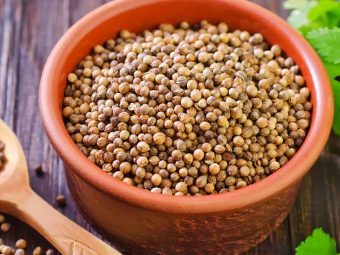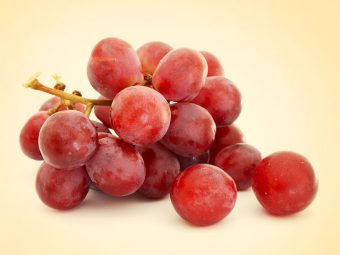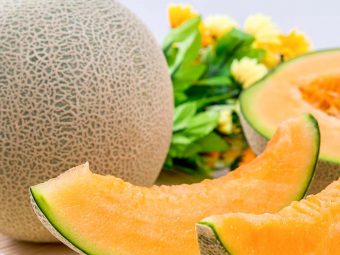[ad_1]
Do you have a preference when it comes to buying eggs? Do you opt for brown eggs more often assuming that they are healthier? Or do you stick to white eggs because that’s what you have always eaten? In the white egg vs. brown egg battle, there certainly is a difference in the color of the eggshells and sometimes in price, but are the differences just shell-deep? Read on to know all the details and facts you need to know to help you make an informed choice when buying eggs next time.
Egg Colors Difference
People tend to opt for brown chicken eggs assuming they are the healthier version just like brown bread, brown rice, or brown pasta. However, that’s not true for eggs. The USDA states that the color of the eggs depends on the breed and genetics of the hens (1), (2), (3).
For example, chicken breeds such as the White Leghorn, White Rock, and Cornish lay white eggs, while Plymouth Rocks, Rhode Island Reds, and New Hampshire lay brown-shelled eggs. Few other chicken breeds like the Araucana, Lushi, Dongxiang, and Ameraucana lay blue-green or blue eggs.
The difference in the non-white color of the eggshells is due to the pigments produced by that particular breed.
- Brown eggshells contain the pigment protoporphyrin IX (4).
- Blue eggshells contain the pigment biliverdin (4), (5).
Sometimes, egg color may vary within the same breed as well, based on their genetic dominance (6).
Apart from the breed and genetics, other factors like the hen’s diet, environment, stress levels, and age may also influence the shell color. While these factors may alter the light or dark shade of the eggs, they do not really change the color of the egg (4).
Are Brown Eggs Healthier Than White Eggs?
Often, people opt for brown eggs believing that brown eggs are more natural and healthier than white eggs. However, that’s not really true. All eggs provide you with similar nutrition irrespective of their eggshell color (1). Research states that the egg composition or quality is not affected by the shell color (7). The color difference is only because of the difference in the pigment in the shell and not the nutritional value. Both brown and white eggs contain high-quality protein, vital vitamins, and minerals (8).
However, there are a few other factors, like the hen’s environment and its feed, that may affect the egg’s nutritional content.
For instance, free-range hens that are allowed enough sunshine are known to produce eggs with a higher amount of vitamin D than eggs from hens raised conventionally in coops and cages (9).
Also, chickens fed a diet enriched with omega-3 fatty acids or vitamin D produce eggs with higher levels of these nutrients respectively (10), (11).
Let’s further see if the taste and size of brown vs. white eggs differ in any way.
Taste And Size Difference
While some people may believe that brown eggs taste better than white eggs, it’s just a matter of personal preference. Just like the nutritional content, the eggshell color doesn’t really determine the taste of the eggs. However, other factors like the type of feed, the breed of chicken, cooking method, and freshness may affect the taste of the eggs (12).
Most home-raised chickens lay brown eggs and taste slightly richer or have a more vibrant yolk because of their feed. This might lead some people to opine that brown eggs taste better than white eggs.
Eggs develop an off-flavor when stored longer, especially at high temperatures (13). Eggs collected fresh from the backyard don’t go through the extra processing and shipping time and hence seem fresher and tastier than the conventional supermarket ones.
Sometimes, the way an egg is cooked might also affect its flavor. One study found that eggs of hens fed conventional feed vs those fed fish-oil-enriched feed tasted the same when scrambled, but not when boiled. The latter variety had an off-sulfur-like flavor (14).
So, while various factors may affect the egg flavor, shell color is not one of them. However, when it comes to size, research suggests that brown eggs are heavier than white eggs and have more shells, more albumen (egg white), and less yolk (15). So it is ultimately as per your personal preference.
Why Are Brown Eggs More Expensive?
Most often than not, you would find brown eggs cost more than white ones, even though they are the same in all aspects except the color. This might often lead people to believe that brown eggs are higher in quality or nutrition than white ones. However, the difference lies in the fact that chickens that lay brown eggs are larger in body size and require more feed, translating into the higher cost of brown eggs on store shelves. Also, some special types of eggs, such as organic or free-range that often tend to be brown are priced higher as well. That may lead you to be aware of certain other considerations while choosing the kind of eggs you go for.
Other Considerations
Rather than the color, which doesn’t really make a difference in the nutritional value of eggs, there are certainly other factors that might help you select better eggs. You can look for egg labels that certify them as
- Organic – eggs from hens fed on pesticide-free grains and diet
- Omega-3 fortified – eggs from hens that are fed on flaxseeds and fish oil to increase the omega-3 fatty acid content.
- Vitamin-enhanced – eggs from hens fed on a vitamin-rich diet.
- Free-range – eggs from hens that are free to roam around and feed as they like.
- Cage-free – eggs from hens kept indoors, but not in cages.
- Antibiotic-free – eggs from hens not treated with any antibiotics
These eggs make for a better option than the commonly available eggs that come from conventionally raised hens.
To Sum Up
Eggs come in different colors – brown, white, blue-green depending on the breed and genetics of the chicken. Unlike brown bread, brown rice, or brown pasta, when it comes to white egg vs. brown eggs, there is no additional health benefits or nutritional difference. Brown eggs are neither healthier nor tastier than white eggs. The factors that do make a difference in egg nutrition and flavor primarily include the hen’s diet and environmental conditions. Next time, you are out to get eggs, either get the ones freshly collected from the farm or opt for USDA certified organic, nutrient-enriched, or free-range eggs. To unscramble it for you, when it comes to the white eggs vs. brown eggs battle, the differences are just about the shell color.
Key Takeaways
- The color of the eggshell depends on the breed and genetics of the hen.
- Environmental factors, diet, stress, and age may also influence the color of the eggs.
- Egg quality, nutrition, and composition are not affected by the eggshell color.
Expert’s Answers For Readers’ Questions
Which egg has more protein white or brown?
Both white and brown eggs have the same amount of protein and other nutrients unless they come from hens that are fed nutrient-fortified diets.
What are Omega eggs?
Eggs from hens that are fed a diet rich in omega-3 fats are labeled as omega eggs.
Are brown eggs fertilized?
Nope, brown and white eggs found at the grocery stores are not yet fertilized.
Sources
Articles on StyleCraze are backed by verified information from peer-reviewed and academic research papers, reputed organizations, research institutions, and medical associations to ensure accuracy and relevance. Read our editorial policy to learn more.
- Shell Eggs from Farm to Table | Food Safety and Inspection Service
https://www.fsis.usda.gov/food-safety/safe-food-handling-and-preparation/eggs/shell-eggs-farm-table#27 - Recent advances in avian egg science: A review
https://www.sciencedirect.com/science/article/pii/S0032579119315895?via%3Dihub - An EAV-HP insertion in 5’ Flanking region of SLCO1B3 causes blue eggshell in the chicken
https://www.ncbi.nlm.nih.gov/pubmed/23359636 - Eggshell color in brown-egg laying hens – a review
https://www.ncbi.nlm.nih.gov/pubmed/26240390 - A study on eggshell pigmentation: biliverdin in blue-shelled chickens
https://www.ncbi.nlm.nih.gov/pubmed/16553287 - Genetic evaluation of eggshell color based on additive and dominance models in laying hens
https://www.ncbi.nlm.nih.gov/pmc/articles/PMC7322644/ - Physical quality and composition of retail shell eggs
https://www.ncbi.nlm.nih.gov/pubmed/20181877 - Eggs, Grade A, Large, egg whole
https://fdc.nal.usda.gov/fdc-app.html#/food-details/748967/nutrients - Free-range farming: a natural alternative to produce vitamin D-enriched eggs
https://www.ncbi.nlm.nih.gov/pubmed/24607306 - Comparative omega-3 fatty acid enrichment of egg yolks from first-cycle laying hens fed flaxseed oil or ground flaxseed
https://www.ncbi.nlm.nih.gov/pubmed/28108729 - Effects of vitamin D(3) -enriched diet on egg yolk vitamin D(3) content and yolk quality
https://www.ncbi.nlm.nih.gov/pubmed/23331294 - Analyses of free amino acid and taste sensor traits in egg albumen and yolk revealed potential of value-added eggs in chickens
https://onlinelibrary.wiley.com/doi/epdf/10.1111/asj.13510 - Egg handling and storage
https://pubmed.ncbi.nlm.nih.gov/9037701/ - Fatty acid profile and sensory characteristics of table eggs from laying hens fed diets containing microencapsulated fish oil – ScienceDirect
http://www.sciencedirect.com/science/article/pii/S0377840110000192 - The effect of storage and strain of hen on egg quality – ScienceDirect
https://www.sciencedirect.com/science/article/pii/S0032579119416611
Related
LATEST ARTICLES
[ad_2]

















